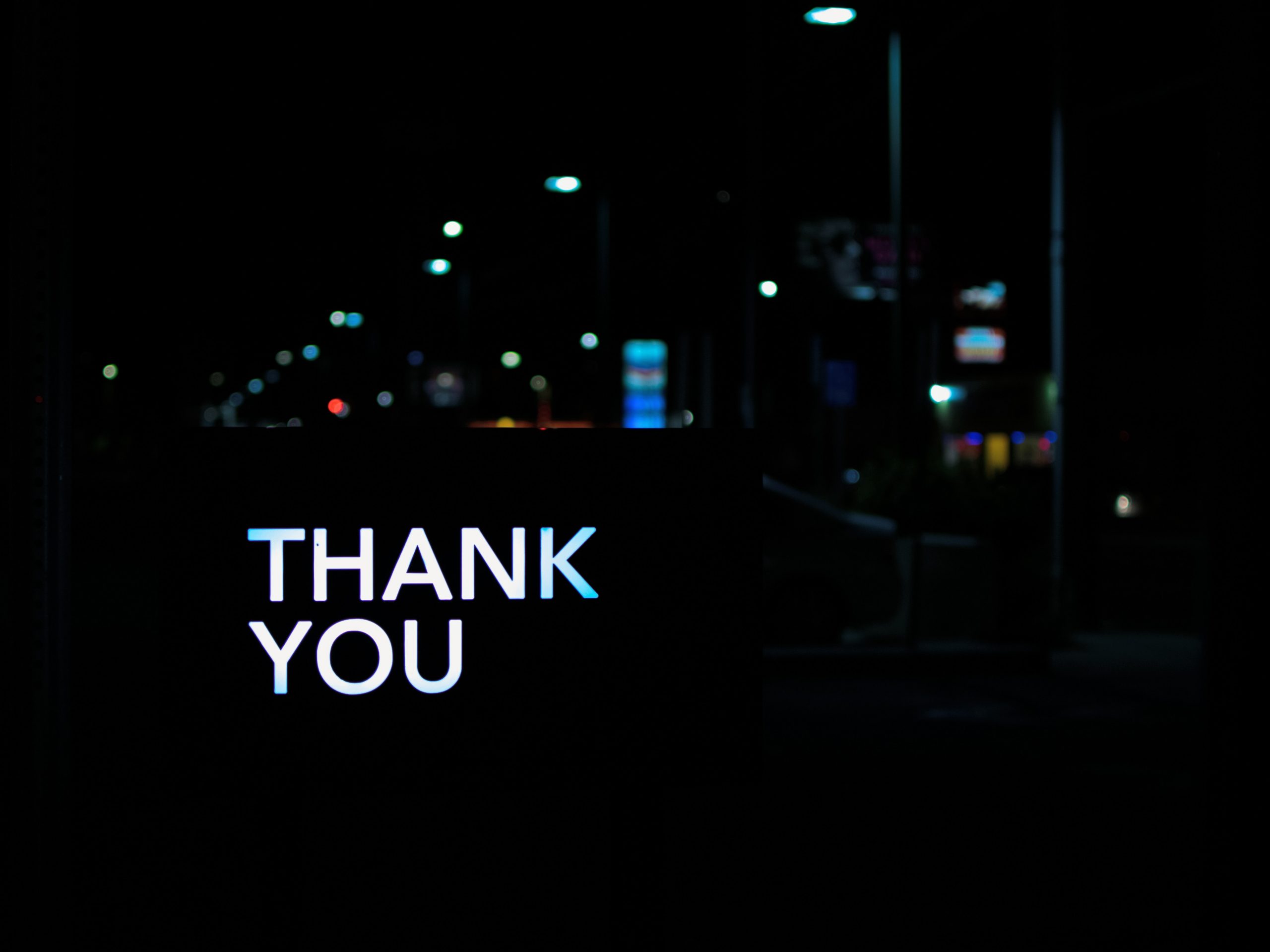by Rikki Lee Travolta
Like any industry, in entertainment, it’s important to show our appreciation for the efforts of others. This can come in the form of a verbal thanks to a casting director for inviting you to an audition or as a symbolic thanks in the form of applause at the end of a dramatic performance.
I’m a “thank you” guy by nature. I even go so far as to send custom, handwritten thank you notes via snail mail.

Photo by Kelly Sikkema on Unsplash
When I perform, I always make it a point to thank the behind-the-scenes talent, because without them we’d just be saying lines in a dark room. I also try to cheerlead my fellow cast members for their efforts because the better they are, the better chance I have of turning in a memorable performance.
Plus, when you acknowledge someone’s efforts, especially with praise, it makes them feel good. There’s just something rewarding about knowing you’ve added a ray of sunshine to someone else’s day.
Indeed, the offering of thanks is a very important building block in establishing the relationships needed to progress in any career. There is no industry where this is as relevant as in show business.
The expression “thank you” is one of the most common and important phrases in the world. It is a way to show our appreciation for the kindness and generosity of others. But where did this phrase come from? And how did it become so ubiquitous?
The earliest origins of “thank you”
The word “thank” comes from the Old English word “þancian,” which means “to think.” This suggests that the original meaning of “thank you” was something like “I will remember what you have done for me.”
Over time, the meaning of “thank you” evolved to become more general. It came to be used to express gratitude for any kind of kindness or generosity, whether big or small. And I, for one, appreciate that.
The phrase “thank you” first appeared in English in the 14th century. It quickly became popular, and by the 16th century, it was being used in all social classes.
The spread of “thank you” around the world
The phrase “thank you” is now used in almost every language in the world. In some languages, it is a direct translation of the English phrase. In other languages, it is a phrase with its own unique meaning and history.
For example, the French word “merci” comes from the Latin word “merces,” which means “wages” or “reward.” This suggests that the original meaning of “merci” was something like “I am in your debt.”
The Spanish word “gracias” comes from the Latin phrase “gratias agere,” which means “to express thanks.” This is similar to the original meaning of the English phrase “thank you.”
The Japanese word “ありがとう” (arigatou) comes from the word “arigatashi,” which means “extremely uncommon” or “rare and precious.” This suggests that the original meaning of “arigatou” was something like “I am deeply grateful for your kindness.”
What it says about you
In addition to the linguistic origins of the phrase “thank you,” there are also some interesting social and cultural factors that have contributed to its widespread use.
For example, the rise of the middle class in Europe during the Renaissance led to a greater emphasis on politeness and etiquette. Saying thank you became a way to show that you were a well-mannered and cultured person. Most actors know at least a bit about the Renaissance.
The spread of Christianity also played a role in the popularity of saying thank you. Christians were traditionally taught to be grateful for all the good things in their lives, and saying thank you is a way to express that gratitude.
Today, saying thank you is considered to be a basic social norm in most cultures around the world – including in entertainment. It is a way to show our appreciation for others, and it is a way to build strong and healthy relationships.
Keanu Reeves is well-known in the entertainment industry for his generosity in showing appreciation to the crew on his films. He went so far as to buy high-end Harley Davidson motorcycles for each member of stunt crew on one film.
Similarly, Taylor Swift recently thanked the truck drivers on her current Eras tour by giving each one a $100,000 bonus. That’s a pretty big thank you.
The importance of saying thank you
I will argue that saying thank you is important for a number of reasons. First, it is a way to show our appreciation for the kindness, generosity, and efforts of others. When we say thank you, we are letting the other person know that we value their actions and that we are grateful for any energies they spend for our benefit.
Second, saying thank you can help to strengthen our relationships with others. When we express our gratitude, we are showing the other person that we care about them and that we value their presence in our lives. Hearing “thank you” or “I appreciate you” means the world to me, and I imagine have similar effects on others.
Third, saying thank you can make us happier. Studies have shown that people who are grateful for the good things in their lives are more likely to be happy and content. I know I feel good when I extend an honest, heartfelt compliment. Part of the main driving force of why I write theatre reviews is that it makes people happy when I extol the virtues of their production – and making other people happy makes me happy. I am one of those people who truly enjoys helping people.
How to say thank you in a meaningful way
There are a number of ways to say thank you in a meaningful way. Here are a few tips:
- Be specific. Instead of saying “thanks,” tell the person what you are specifically grateful for. For example, you could say “Thank you for helping me with my homework” or “Thank you for the delicious meal.”
- Be sincere. Make sure your words come from the heart. The other person will be able to tell if you are being genuine.
- Be timely. Don’t wait too long to say thank you. The sooner you express your gratitude, the more meaningful it will be.
Of course, in the theater, the customary way to thank the performers and behind-the-scenes creatives is through applause. That’s my addiction – standing on stage and letting the thunderous clapping of hands wash over me and bathe me in acceptance.
And, in knowing how this feels, I make it a point to always be the first to applaud when attending a theatrical performance. It takes mere moments of effort and yet has such a resounding effect on the focus of the adorations.
Make it a point to express your thanks
Saying thank you is a simple but important way to show our appreciation of others. It is a phrase that is used in almost every language in the world, and it has a long and rich history.
When we say thank you, we are not only expressing our gratitude, but we are also strengthening our relationships with others and making ourselves happier. So next time someone does something nice for you, be sure to say thank you in a meaningful way.
In terms of theater, the next time you attend a play or a musical, clap loud and long – the people on stage will love you for it.





